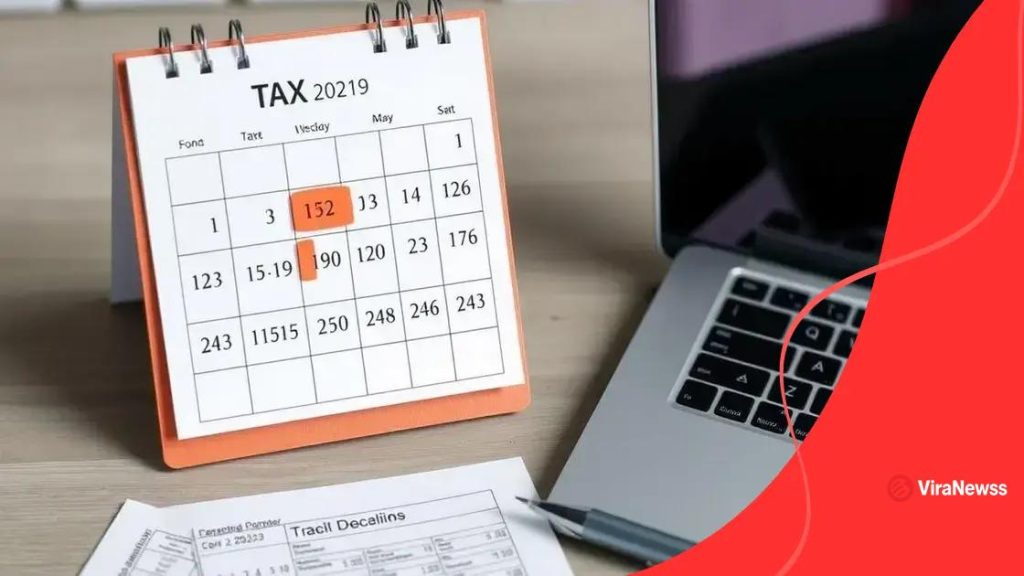Issuance of reminders for the tax filing deadline

Anúncios
Issuance of reminders for the tax filing deadline helps individuals stay organized, avoid penalties, and ensure timely submission of tax documents by using effective scheduling and notification systems.
Issuance of reminders for the tax filing deadline can be a game changer for many individuals. Ever felt that last-minute panic during tax season? Discover how reminders can help you stay organized and stress-free.
Anúncios
Understanding tax filing deadlines
Understanding tax filing deadlines is crucial for anyone looking to avoid penalties and ensure compliance. Knowing when to file can save you time and stress. In this section, we will explore what tax filing deadlines are and why they matter.
What Are Tax Filing Deadlines?
Tax filing deadlines are specific dates set by the government by which taxpayers must submit their tax returns. Ignoring these deadlines can lead to penalties.
Importance of Meeting Deadlines
Meeting your tax filing deadlines is essential for several reasons:
Anúncios
- To avoid penalties and interest on overdue payments.
- To maintain a good relationship with the tax authorities.
- To have ample time to prepare your finances for the next tax year.
Additionally, understanding the deadlines helps you plan better. For example, most individuals need to file their taxes by April 15 each year. Some people might receive extensions, but it’s important to remember that extensions to file are not extensions to pay any owed taxes.
Another key point to note is that different types of taxpayers may have different deadlines. Businesses, for instance, often have different dates than individual taxpayers. Keeping these differences in mind can help streamline your tax preparation process.
How to Keep Track of Deadlines
One effective way to keep track of tax filing deadlines is to use a calendar. Here are some tips to stay organized:
- Mark important dates on your calendar.
- Set reminders a week in advance.
- Use tax preparation software that alerts you to deadlines.
Also, staying informed about any policy changes that may affect deadlines can significantly improve your compliance. Tax laws can change, and being updated can save you from potential issues.
Understanding tax filing deadlines not only ensures you file on time but also allows you to plan effectively for your financial future. It is a step towards responsible financial management.
The importance of reminders for tax tasks
The importance of reminders for tax tasks cannot be overstated. Managing your taxes is a critical responsibility, and reminders can make this process much easier. By setting reminders, you ensure that you don’t miss important deadlines that could result in financial penalties.
Why Use Reminders?
Reminders help keep your tax obligations in the forefront of your mind. They can assist you in maintaining organization throughout tax season. When you know what deadlines are approaching, you can prepare your documents in advance.
Benefits of Setting Reminders
Here are some benefits of using reminders for tax tasks:
- Reduces stress by keeping you organized.
- Prevents late fees and penalties.
- Allows for better time management when gathering documents.
- Encourages more proactive approaches to your finances.
Incorporating reminders into your tax routine can create a more efficient process. Digital calendars, such as those on your phone or computer, are excellent tools for this. Setting alerts can give you enough time to collect information and avoid last-minute scrambles.
Additionally, using an app specifically designed for tax management can streamline your tasks. Many of these apps send notifications about deadlines and provide checklists for what documents you need to prepare. This can simplify your workflow and keep everything on track.
Creating a Reminder System
To effectively use reminders for tax tasks, consider these tips:
- Establish a clear system that works for you.
- Set reminders at multiple intervals—such as one month, one week, and one day before deadlines.
- Utilize both electronic and physical methods, like a wall calendar.
Staying on top of your tax tasks through reminders helps create a routine that eases the stress of tax season. By being organized and prepared, you can approach your taxes with confidence.
How to set up effective reminders

Setting up effective reminders is a key aspect of managing your taxes smoothly. Proper reminders can help you stay on track with your tax tasks. This section explores practical steps for creating a reminder system that fits your needs.
Selecting the Right Tools
There are many tools available for setting reminders. You can use digital calendars, reminder apps, or even sticky notes. Choose the method that you find most accessible. Digital tools often provide alerts that are easier to customize.
Creating a Reminder Schedule
Building a reminder schedule is essential. Start by identifying important tax deadlines, such as:
- Filing deadlines for federal and state taxes.
- Payment due dates for any taxes owed.
- Dates for estimated tax payments, if applicable.
Once you’ve listed these dates, decide when to set your reminders. A week before a deadline is usually a good time to start preparing.
You can also create multiple reminders. Setting alerts one month, one week, and one day in advance can help ensure you’re always prepared. This layered approach provides ample time to gather all necessary documents.
Utilizing Calendar Features
Most digital calendars have built-in features that allow you to set recurring reminders. This function is particularly useful for tasks that occur yearly, such as tax filing. Consider syncing your calendar with your phone to get on-the-go notifications.
Additionally, when setting a reminder, add notes that outline what you need to accomplish. This detail can help keep you focused on what’s important.
Staying Flexible
Lastly, remain flexible with your reminders. As tax laws change or your financial situation shifts, adapt your reminder system accordingly. Regularly reviewing your reminder settings ensures they remain effective.
Implementing these strategies will lead to a more organized approach to your tax responsibilities. The peace of mind that comes from being prepared can reduce stress significantly during tax season.
Consequences of missed tax deadlines
Understanding the consequences of missed tax deadlines is vital for all taxpayers. Failing to file your taxes on time can lead to serious repercussions, both financially and legally.
Financial Penalties
When you miss a tax deadline, you are typically subject to financial penalties. This can include:
- Late payment fees: These are additional costs that accumulate the longer you delay making your payment.
- Interest charges: If you owe taxes, interest accrues until the balance is paid in full.
- Failure to file penalty: This penalty is usually higher than the failure to pay penalty, making it crucial to at least file your return on time.
These financial consequences can add up quickly, making tax time much more stressful than it needs to be.
Legal Implications
Tax laws are stringent, and missing deadlines can also put you at risk of legal action. For instance, if the IRS determines that there was negligence or fraudulent behavior involved in your late payment, you could face significant penalties or even criminal charges.
Moreover, the IRS has the authority to garnish wages, seize bank accounts, and take other actions to collect unpaid taxes. This can lead to a cycle of debt that is hard to escape.
Impact on Your Financial Future
Missing tax deadlines can also impact your future financial decisions. A failure to file could damage your credit score, which is crucial for obtaining loans or credit cards in the future. Additionally, if you consistently miss deadlines, it can raise red flags with lenders and financial institutions.
Being proactive about your tax obligations can help to avoid these serious consequences. Keeping reminders and planning ahead are effective strategies to ensure that you meet all your tax deadlines.
Tips for efficient tax filing
Efficient tax filing can save you time and stress. Implementing a few simple tips can lead to a smoother process. Understanding how to approach your tax filings will help you prepare better and avoid mistakes.
Organize Your Documents
The first step to efficient tax filing is to gather and organize your documents. You’ll need:
- W-2 forms from your employers.
- 1099 forms for freelance or contract work.
- Receipts for deductible expenses.
- Bank statements to verify interest income.
Keeping these documents in one place, such as a dedicated folder, can streamline your preparation process.
Use Tax Filing Software
Using tax filing software can significantly enhance your efficiency. Many programs offer user-friendly interfaces and simple step-by-step guidance. They can also help you:
- Automatically calculate your tax owed or refund.
- Identify deductions and credits you may qualify for.
- File your return electronically, expediting the process.
Filing electronically not only speeds up submission but also minimizes errors that can occur in paper filing.
Review Before Submission
Before submitting your tax return, always review it carefully. Common mistakes include errors in calculations or incorrect personal information. Double-checking your entries can prevent potential issues and delays.
Consider having someone else look over your return. A fresh set of eyes might catch errors you missed, ensuring your filing is accurate.
Set a Filing Schedule
Creating a filing schedule helps you manage your time effectively. Schedule specific days for gathering documents, filling out forms, and reviewing your tax return. By dividing the work, you can reduce pressure and maintain better focus.
Setting earlier deadlines for yourself can also give you extra time to address unforeseen issues, like missing documents.
By following these tips for efficient tax filing, you can turn a potentially overwhelming task into a manageable process. Staying organized and proactive is key to making tax season a breeze.
In conclusion, being organized and timely with your tax filings is essential for avoiding complications. By understanding the importance of deadlines, using reminders effectively, and implementing efficient filing strategies, you can reduce stress and ensure compliance. Maintaining a proactive approach to your taxes will help you navigate the process smoothly and may even lead to savings. Remember, taking these steps not only benefits you now but also helps secure your financial future.
FAQ – Frequently Asked Questions about Tax Filing
What are the consequences of missing tax deadlines?
Missing tax deadlines can lead to penalties, interest charges, and even legal consequences, such as wage garnishments.
How can I prepare my documents for tax filing?
Organize all necessary forms, receipts, and statements in a dedicated folder to simplify the preparation process.
What are the benefits of using tax filing software?
Tax software can help you calculate amounts owed, identify deductions, and file your return electronically to save time and reduce errors.
How often should I review my tax documents?
You should review your tax documents regularly, especially before filing, to ensure accuracy and completeness.





